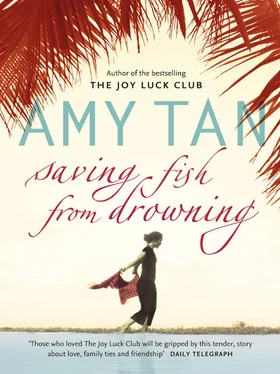Look at Vera’s two daughters, I often mused—they have always adored her, even in their teens. They were the progeny that people can only dream of. Might my child have had similar feelings for me? I would have seated her on my lap and brushed her hair, smelling the clean scent. I imagined myself tucking a peony behind her ear, or clipping in her hair a pretty barrette speckled with emeralds. And we would look in the mirror together and know we loved each other so much that tears would spring to our eyes. I realized much later that the child I imagined was my young self, who had longed for just such a mother.
I admit that whenever I heard that certain offspring of friends had turned into misfits and ingrates, I received the news with schadenfreude, and also was relieved to have missed the entire spectrum of parental frustration and despair. What could possibly be more socially devastating than having your own child declare that she hated you, and in front of your less-than-best friends?
This question came to me as I watched Lucinda Pari, the director of communications for the Asian Art Museum, rise and approach the lectern to provide her own contribution to my eulogy. She had once told me that I was like a mother to her. Now here she was at my memorial, praising my virtues: “The money from Bibi Chen’s estate”—she paused to toss her sleek curtain of hair like a racehorse—“money derived from the sale of her deluxe three-unit apartment building and gorgeous , bridge-view penthouse on Leavenworth, in addition to her store, the legendary Immortals, and its enormously successful online catalogue business, on top of a personal collection of Buddhist art—a very fine and well-regarded collection, I might add—has been willed in trust to the museum.” Loud clapping ensued. Lucinda’s talent has always been to mix drama and exaggeration with dull facts so that words balanced out as believable. Before the applause could turn thunderous, she held up her palm and continued: “She leaves us with an estate estimated to be—wait a minute, here it is— twenty million dollars.”
Nobody gasped. The crowd did not jump up and cheer. They clapped loudly, but I wouldn’t say wildly. It was as if my bequest had been expected, and an ordinary amount. When the room quieted all too soon, she held up a plaque. “We will be affixing this in commemeration of her generosity in one of the wings in the new Asian, to be opened in 2003.”
One wing! I knew I should have specified the degree of recognition I should receive for my twenty million. What’s more, the plaque was a modest square, brushed stainless steel, and my name was engraved in letters so small that even the people in the front row had to lean forward and squint. This was the style Lucinda liked, modern and plain, sans serif type as unreadable as directions on a medicine bottle. She and I used to argue in a friendly way about the brochures she had expensive graphic artists design. “Your eyes are still young,” I told her not too long ago. You must realize, people who give vast amounts of money, their eyes are old. If you want this style, you should give people reading glasses to go with it.” That’s when she laughed in a not-so-joking way and said, “You’re just like my mother. There’s always something not right.”
“I’m giving useful information,” I told her.
“Like my mother,” she said.
At my funeral, she said those words again at the very end, only this time she was smiling with tearful eyes: “Bibi was like a mother to me. She was terribly generous with her advice.”
MY OWN MOTHER did not give me advice, terrible or otherwise. She died when I was a baby. So it was my father’s first wife who raised my two brothers and me. She was named Bao Tian—“Sweet Bud,”—which was not quite suitable. We, her stepchildren, were obliged to call that old sour-mouth by the affectionate name of Sweet Ma. Whatever emotional deficits I had, they were due to her. My excesses, as I have already said, were from my mother.
According to Sweet Ma, she would have been my father’s only wife had she not insisted that my father take a concubine so he could seed some descendants. “It was my own idea,” Sweet Ma boasted. “I wasn’t forced to accept the arrangement, not at all.”
As the fates would have it, Sweet Ma was unable to bear children. Soon after she married she caught a spotted-skin disease—it might have been measles, or chickenpox, but was definitely nothing as serious as smallpox. The aftermath of this illness, she lamented, blocked off the path to the warm springs of her body, and thus, she did not have sufficient heat to incubate the seeds of babies. Instead, this useless warmth rose in her body and continued to break out as blisters on her face and hands, and perhaps the rest of her, which we couldn’t see, nor did we want to. Time and time again, she would wonder aloud over what she had done in a past life to deserve such a barren fate. “What small transgression for such bitter punishment?” she cried as the red dots rose. “No children of my own, just the leftovers of others” (meaning my brothers and me). Whenever she ate anything that disagreed with her, from unripe kumquats to veiled insults, her face was soon decorated with crusty splotches that resembled maps of foreign countries. “Do you know where India is?” we would ask her, and swallow our giggles. To soothe herself, she scratched and complained incessantly, and when she ran out of things to say, she would look at me and criticize my mother for endowing me with such ugly features. In time, she scratched her eyebrows bald, and when she did not draw them in with mean black slashes, she resembled a Buddhist nun with knots on her forehead, bulging with anger.
That is how I remember Sweet Ma, always running a sharp finger along her hairless eyebrows, chattering nonsense. My older brothers managed to escape her grasp. They were immune to her influence and treated her with blank-faced disdain. Thus, all her arrows fell on me as her solitary target.
“I tell you this,” Sweet Ma would say to me, “only so you won’t be stricken sick to hear it from someone else.” And she would tell me once again that my mother had been a tiny girl like me, but not as squat, barely seventy pounds at age sixteen when my father took her in as his breeding concubine.
“Itty-bitty though she was,” Sweet Ma said, “she was excessive in everything she did. She ate too many pears. She showed too much emotion. Why, when she laughed she could not control herself, and would fall to the floor in a fit of giggles until I slapped her back to her senses. What’s more, she slept all night long, yet yawned all day. She slept so much her bones turned soft. That was why she was always collapsing like a jellyfish out of water.”
During wartime, when the price of fatty pork had tripled, Sweet Ma could be heard to declare: “Though we have money enough, I’m content to eat meat sparingly, just for the taste and certainly not more than once a week. But your mother, when she was alive, her eyes were like those of a carrion bird, ready to pounce on any dead flesh.” Sweet Ma said a decent woman should never show eagerness for food or any other kind of pleasure. Most of all, she should “never be a burden,” this being what Sweet Ma strived not to be, and she desired in particular for my father to acknowledge this as often as she did.
In those days, we lived in a three-story Tudoresque manor on Rue Massenet in the French Concession of Shanghai. This was not in the best of the best neighborhoods, not like Rue Lafayette, where the Soongs and the Kungs lived, with their villas and vast, multiacred gardens, croquet lawns, and pony carts. Then again, we were not the kind of family to rub our bountiful luck into the faces of our inferiors. All in all, our house was still quite good, better than most people could say they live in, even in comparison with today’s multimillion-dollar San Francisco homes. My father’s family had a longtime cotton mill business and the department store Honesty, which he and my grandfather had started in 1923. It was maybe one degree less prestigious than the department store Sincerity, and while our store was not as large, our merchandise was just as good, and in the case of cotton goods, the quality was even better for the same price. All my father’s foreign customers said so.
Читать дальше












